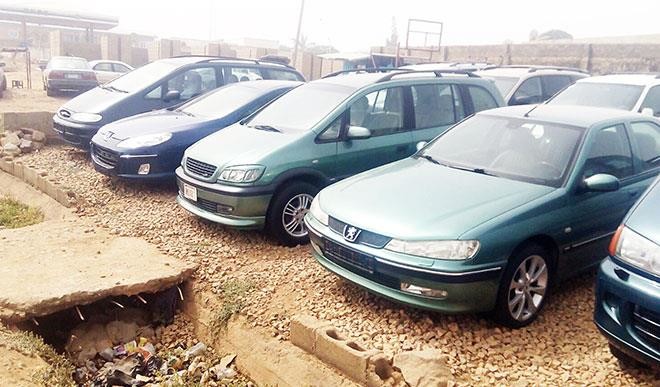‘Naira’s fall killing car dealerships’
Julius Bwala has been selling used cars for some years since he graduated from University of Maiduguri. The business has thrived in Kaduna and he now has five people working under him. But the fall of the naira is beginning to affect the business. “You wake up a certain day and hear that the naira […]


Julius Bwala has been selling used cars for some years since he graduated from University of Maiduguri. The business has thrived in Kaduna and he now has five people working under him. But the fall of the naira is beginning to affect the business.
“You wake up a certain day and hear that the naira has fallen. Because the dollar is on the rise now, any car one buys is at a higher price,” Bwala said.
Auwal Ibrahim Raba of Masalaci Motors lamented that “nobody can travel to bring in a car now. What one bought at N500,000 is now almost twice the price.”
Presently, vehicles Raba buys at N700,000 and sold at N800,000 cost over N1 million to purchase and resell. “If I try to sell what I bought for N1m at the rate of N1.1m, nobody will buy,” adding that it has affected his business a great deal.
Bwala intimates that a Corolla 2003 model which he brings in at N1.5m is now N1.9m, saying customers would not want to buy such vehicles. “The major problem we have now is the inability to make turnovers. This is why customers are few now and they would rather opt for second-hand cars available within the country.” he explained.
It took Bwala years to build his business, which has paid his bills thus far. When he graduated from the university where he studied Accounting, he had one dream – to work at the Central Bank of Nigeria. But he became a car dealer instead. “After my NYSC in 2009, I returned to Kaduna where I was unable to get a job. I had a brother who was into the business of selling vehicles and he introduced me to it,” he said.
Bwala’s first buy was a Golf 3 saloon car. His expense for the trip, including purchase and fuelling, amounted to N500,000 in Cotonou, Benin Republic. Before his trip, he had acquired an ECOWAS passport. “The border is not far from Lagos, so after you buy a vehicle you are required to pay a fee, and then another for security – where the car is kept – you then buy batteries for the car and other necessary equipment and make payment for final clearance. At the Nigerian border, one is required to pay the Nigerian Customs and then drive the car or hire a driver,” he explained.
When Bwala drove into Kaduna, he needed a place to display his product. Fortunately, an acquaintance at Halima Junction who sold used cars agreed to let him showcase it there. That was how, within two months, he sold the car at the rate of N580,000. News travelled fast and a neighbour requested for an Opel brand and Bwala obliged. He started travelling more frequently and soon realised doing so was far more beneficial because he would not have to deal with the uncertainty of when he would make a return on his investment.
Felix John wanted to buy a 2000 model Toyota Metrix in January 2016, and had quite an experience doing so. He went back and forth with the dealers in Kano who always informed him about the fluctuation in prices of vehicles in Cotonou.
When John heard that a Toyota Metrix was N1.4m instead of the N1.2m he had, he was distraught because he believed the Metrix was the ideal choice for his wife. So he had to buy a Camry because he was not certain how expensive cars would get if he waited.
Recently, Daily Trust reported that the Naira is gradually regaining its value at the bureau de change as it exchanged at N310 to the dollar. Checks at the Zone 4, Abuja BDC market showed that the operators were buying at N310 to one dollar from walk-in customers as against the about N400 it went for last week.
The rise of the dollar against the naira has since affected the prices of goods coming into the country.
